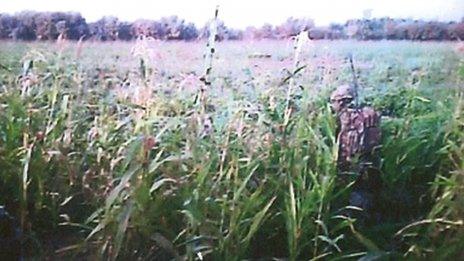Marine guilty of Afghanistan murder
- Published
Extract from helmet camera recording of incident in Helmand, Afghanistan
A Royal Marine has been found guilty by a military court of murdering an injured Afghan insurgent, in what the prosecution called "an execution".
The sergeant, known only as Marine A, faces a mandatory life term over the shooting of the unknown man while on patrol in Helmand Province, in 2011.
Two other marines were cleared.
Brigadier Bill Dunham, of the Royal Marines, said the murder - the first case of its kind - was "a truly shocking and appalling aberration".
There were tears from the marines' families as the verdicts were read at the Military Court Centre in Bulford, Wiltshire, on Friday.
Marine A, who will be sentenced on 6 December, was taken into custody, while the two other marines, known as B and C, are free to return to military service. An anonymity order granted last year to protect the men from possible reprisals remains in place.
'9mm pistol'
Brigadier Bill Dunham: "It was a truly shocking and appalling aberration. It should not have happened, and it should never happen again"
Marine B had inadvertently filmed the murder, which happened on 15 September 2011, on his helmet-mounted camera and the footage was shown to the court during the two-week trial.
It showed Marine A shooting the Afghan prisoner with a 9mm pistol, and saying: "There, shuffle off this mortal coil... It's nothing you wouldn't do to us."
He adds: "Obviously this doesn't go anywhere fellas. I just broke the Geneva Convention," to which Marine B replies: "Yeah, roger mate."
On Thursday, a recording of a conversation between the marines in the moments surrounding the shooting was released by the judge.
He had previously rejected an application by the media to release the video footage, saying it could be used as propaganda against the UK military.
During the court martial, prosecutor David Perry told the court the murder was "not a killing in the heat and exercise of any armed conflict... it amounted to an execution".
Marine A told the court martial he had fired because of "poor judgement and lack of self-control", but said he had thought the insurgent was already dead.
Marines B and C were accused by the prosecution of being "party to the killing" and of having "encouraged and assisted" Marine A to commit the murder.
At the time of the killing, he was an experienced sergeant, while Marine C was the most junior of the three. Marine B was new to the Helmand base where marines A and C were based.
Marine A was convicted by a board of seven officers and non-commissioned officers.
Brig Dunham, deputy commandant general of the Royal Marines, said: "It is a matter of profound regret that, in this isolated incident, one marine failed to apply his training and discharge his responsibilities.
"What we have heard over the past two weeks is not consistent with the ethos, values and standards of the Royal Marines.
"It was a truly shocking and appalling aberration. It should not have happened and it should never happen again."
He said the Royal Marines would consider any impact from the case on the training given to its personnel.
Gen Sir Mike Jackson, a former head of the Army, urged people to keep "a sense of proportion" but said he was "saddened" by the case.
"I'm afraid whatever casualties the unit had taken, didn't change the law.
"It's not about whether the Taliban do or do not adhere to whatever set of rules, if any. It is about the standards which apply to the British armed forces which are drawn from the Geneva Convention."
He added: "The fact that a trial has taken place, I would argue upholds those standards."
Under attack
The murder took place after a patrol base in Helmand Province came under attack from small arms fire from two insurgents.
The Afghan prisoner was seriously injured by gunfire from an Apache helicopter sent to provide air support, and the marines found him in a field.

The judge released stills from the footage but not the footage itself
In one conversation between Marine A and C about shooting the man, one serviceman is overheard asking "Anyone want to give first aid to this idiot?" before another replies loudly "Nope."
In another, Marine C was heard asking A if he should shoot the man in the head, but Marine A said that would be too "obvious".
Royal Military Police arrested the three marines in October 2012 after video footage was found on a serviceman's laptop by civilian police in the UK.
They first appeared at the Military Court Centre in Bulford in August, where they pleaded not guilty to murdering the Afghan national contrary to section 42 of the Armed Forces Act 2006., external
Two further marines - D and E - had the charges against them dropped in February.
The case was the first time British forces have faced a murder charge in relation to the conflict in Afghanistan, said BBC defence correspondent Caroline Wyatt.
Prof Michael Clarke, director of the Royal United Services Institute, said the Ministry of Defence needed to be transparent in cases such as this.
"The only thing the MoD can do is not try to hide in cases that look as bad as this, and they're going to have to accept that if we fight these wars, there will be cases that we are not very proud of," he said.
- Published8 November 2013
- Published8 November 2013
- Published8 November 2013
- Published7 November 2013